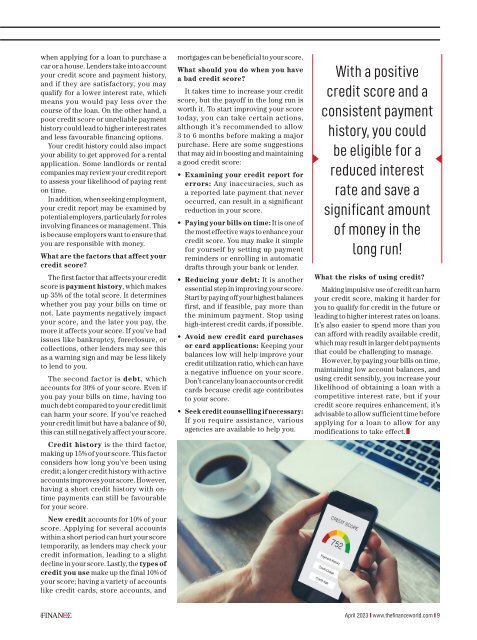The Finance World Magazine| Edition: April 2023
The April edition of The Finance World Magazine (TFW) delves into the world of disruptive investment and its potential to transform markets, featuring an exclusive interview with Hadif Abdullah Zamzam, Senior Associate – Value Creation, Disruptive Investments at Mubadala, who shares his insights on this topic. In addition, we feature interviews with prominent CEOs, including Nilay Ranjan Singh of State Bank India, DIFC, Raman Thiagarajan, CEO & Founder of Zenda, and Naveen Bharadwaj, Group CEO of Trescon. They provide valuable insights on various topics related to business and investments, particularly in the fintech area. Through this edition, we also bring you insights on topics like the UAE and Turkey CEPA agreement that sets the ground for novel business opportunities, cryptocurrency adoption in the UAE and how it is expected to disrupt trade and payment systems, buying and selling properties in Dubai and strategies to boost profitability, and many more articles that offer critical analysis and insights on current trends and issues in the business and investment domains. Keep yourself up to date with all financial sector news with our current news segments. Each person can find something unique from us. We believe our readers deserve real value from what we have to offer.
The April edition of The Finance World Magazine (TFW) delves into the world of disruptive investment and its potential to transform markets, featuring an exclusive interview with Hadif Abdullah Zamzam, Senior Associate – Value Creation, Disruptive Investments at Mubadala, who shares his insights on this topic.
In addition, we feature interviews with prominent CEOs, including Nilay Ranjan Singh of State Bank India, DIFC, Raman Thiagarajan, CEO & Founder of Zenda, and Naveen Bharadwaj, Group CEO of Trescon. They provide valuable insights on various topics related to business and investments, particularly in the fintech area.
Through this edition, we also bring you insights on topics like the UAE and Turkey CEPA agreement that sets the ground for novel business opportunities, cryptocurrency adoption in the UAE and how it is expected to disrupt trade and payment systems, buying and selling properties in Dubai and strategies to boost profitability, and many more articles that offer critical analysis and insights on current trends and issues in the business and investment domains.
Keep yourself up to date with all financial sector news with our current news segments. Each person can find something unique from us. We believe our readers deserve real value from what we have to offer.
Create successful ePaper yourself
Turn your PDF publications into a flip-book with our unique Google optimized e-Paper software.
when applying for a loan to purchase a<br />
car or a house. Lenders take into account<br />
your credit score and payment history,<br />
and if they are satisfactory, you may<br />
qualify for a lower interest rate, which<br />
means you would pay less over the<br />
course of the loan. On the other hand, a<br />
poor credit score or unreliable payment<br />
history could lead to higher interest rates<br />
and less favourable financing options.<br />
Your credit history could also impact<br />
your ability to get approved for a rental<br />
application. Some landlords or rental<br />
companies may review your credit report<br />
to assess your likelihood of paying rent<br />
on time.<br />
In addition, when seeking employment,<br />
your credit report may be examined by<br />
potential employers, particularly for roles<br />
involving finances or management. This<br />
is because employers want to ensure that<br />
you are responsible with money.<br />
What are the factors that affect your<br />
credit score?<br />
<strong>The</strong> first factor that affects your credit<br />
score is payment history, which makes<br />
up 35% of the total score. It determines<br />
whether you pay your bills on time or<br />
not. Late payments negatively impact<br />
your score, and the later you pay, the<br />
more it affects your score. If you’ve had<br />
issues like bankruptcy, foreclosure, or<br />
collections, other lenders may see this<br />
as a warning sign and may be less likely<br />
to lend to you.<br />
<strong>The</strong> second factor is debt, which<br />
accounts for 30% of your score. Even if<br />
you pay your bills on time, having too<br />
much debt compared to your credit limit<br />
can harm your score. If you’ve reached<br />
your credit limit but have a balance of $0,<br />
this can still negatively affect your score.<br />
Credit history is the third factor,<br />
making up 15% of your score. This factor<br />
considers how long you’ve been using<br />
credit; a longer credit history with active<br />
accounts improves your score. However,<br />
having a short credit history with ontime<br />
payments can still be favourable<br />
for your score.<br />
New credit accounts for 10% of your<br />
score. Applying for several accounts<br />
within a short period can hurt your score<br />
temporarily, as lenders may check your<br />
credit information, leading to a slight<br />
decline in your score. Lastly, the types of<br />
credit you use make up the final 10% of<br />
your score; having a variety of accounts<br />
like credit cards, store accounts, and<br />
mortgages can be beneficial to your score.<br />
What should you do when you have<br />
a bad credit score?<br />
It takes time to increase your credit<br />
score, but the payoff in the long run is<br />
worth it. To start improving your score<br />
today, you can take certain actions,<br />
although it’s recommended to allow<br />
3 to 6 months before making a major<br />
purchase. Here are some suggestions<br />
that may aid in boosting and maintaining<br />
a good credit score:<br />
• Examining your credit report for<br />
errors: Any inaccuracies, such as<br />
a reported late payment that never<br />
occurred, can result in a significant<br />
reduction in your score.<br />
• Paying your bills on time: It is one of<br />
the most effective ways to enhance your<br />
credit score. You may make it simple<br />
for yourself by setting up payment<br />
reminders or enrolling in automatic<br />
drafts through your bank or lender.<br />
• Reducing your debt: It is another<br />
essential step in improving your score.<br />
Start by paying off your highest balances<br />
first, and if feasible, pay more than<br />
the minimum payment. Stop using<br />
high-interest credit cards, if possible.<br />
• Avoid new credit card purchases<br />
or card applications: Keeping your<br />
balances low will help improve your<br />
credit utilization ratio, which can have<br />
a negative influence on your score.<br />
Don’t cancel any loan accounts or credit<br />
cards because credit age contributes<br />
to your score.<br />
• Seek credit counselling if necessary:<br />
If you require assistance, various<br />
agencies are available to help you.<br />
With a positive<br />
credit score and a<br />
consistent payment<br />
history, you could<br />
be eligible for a<br />
reduced interest<br />
rate and save a<br />
significant amount<br />
of money in the<br />
long run!<br />
What the risks of using credit?<br />
Making impulsive use of credit can harm<br />
your credit score, making it harder for<br />
you to qualify for credit in the future or<br />
leading to higher interest rates on loans.<br />
It’s also easier to spend more than you<br />
can afford with readily available credit,<br />
which may result in larger debt payments<br />
that could be challenging to manage.<br />
However, by paying your bills on time,<br />
maintaining low account balances, and<br />
using credit sensibly, you increase your<br />
likelihood of obtaining a loan with a<br />
competitive interest rate, but if your<br />
credit score requires enhancement, it’s<br />
advisable to allow sufficient time before<br />
applying for a loan to allow for any<br />
modifications to take effect.<br />
<strong>April</strong> <strong>2023</strong> www.thefinanceworld.com 9

















